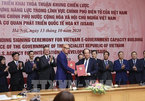 |
Vietnam’s southern province of Binh Phuoc is going to welcome fresh investment of $230 million from Indonesian-based group Japfa Comfeed Vietnam. The move, to be implemented in two phases over the next four years, is helping to demonstrate the company’s ambition to further boost its footprint in the Southeast Asian nation.
While Indonesia’s investment in Vietnam remains modest, reaching around $10 million between January and October and an accumulated $608.1 million as of November 20, Japfa Comfeed’s new investment is expected to change this picture soon.
Indonesia is the initiator of the recently-signed Regional Comprehensive Economic Partnership (RCEP) between 10 ASEAN member countries and the five Asia-Pacific nations of Australia, China, Japan, South Korea, and New Zealand. In addition to trade, the RCEP is likely to ignite more investment inflows.
Wider investment space
The RCEP region is already an important foreign direct investment (FDI) destination, accounting for 16 per cent of global FDI. Thailand, Singapore, Malaysia, China, Japan, South Korea, and New Zealand are already among the top foreign investors in Vietnam.
Among the nation’s top 10 foreign investors, six are RCEP members, with South Korea being the biggest with an accumulated $70.5 billion, followed by Japan ($60.1 billion), Singapore ($56.3 billion), China ($18.28 billion), Malaysia ($12.8 billion), and Thailand ($12.8billion), as of November 20.
Prof. Nguyen Mai, senior economist and chairman of the Vietnam Association of Foreign-Invested Enterprises, emphasised that the RCEP will help Vietnam enlarge its investment space and trade in the long term, especially in the context of COVID-19.
Minister of Industry and Trade Tran Tuan Anh also noted, “Together with other ASEAN nations, Vietnam is likely to become a hub for international investors, including those from within the RCEP.”
The agreement is creating the world’s largest trading bloc, with a total population of 2.2 billion and GDP of $26.2 trillion. It is expected to cover all aspects of business including trade, services, e-commerce, telecommunications, small- and medium-sized enterprises, government procurement, and intellectual property.
Like the recently-ratified EU-Vietnam Free Trade Agreement (EVFTA) and the Comprehensive and Progressive Agreement for Trans-Pacific Partnership, the RCEP will reduce tariffs and set trade rules, and help link supply chains. Tariffs are expected to be reduced within 20 years.
The tariff cut proves to be a great motivation that encourages businesses to expand to and in Vietnam. For instance, the implementation of the EVFTA in August has already helped to boost growing confidence among EU businesses in the country.
Nicolas Audier, chairman of the European Chamber of Commerce in Vietnam (EuroCham) said, “Our data shows that falling tariffs and growing market access are important to our members, and will help to spur new foreign direct investment from the EU in the future.”
EU businesses feel more positive both about their own enterprises and Vietnam’s trade and investment environment. EuroCham’s Business Climate Index (BCI) has rebounded in the third quarter, jumping 24 points to reach 57.5 – the highest score since the outbreak of the global COVID-19 pandemic.
Similar sentiment has been seen among businesses from Thailand, Singapore, Malaysia, China, Japan, South Korea, and New Zealand. In particular, the strategic partnership has been tightened since the signing of the Vietnam-South Korea FTA in 2015.
Lee Jong Seob, president of the Korea Trade-Investment Promotion Agency in Southeast Asia-Oceania cum general director of the agency in Hanoi, elaborated that so far this year, South Korea has been pouring $3.7 billion into 573 projects in the country. While the RCEP will take effect after at least six ASEAN countries and three non-ASEAN members ratify the deal, this nevertheless sets the tone for future trade and investment in Vietnam, especially when the country has new and preponderant policies to welcome investment shifts.
The sectors to flourish
Telecommunications, IT, textiles and garments, footwear, services, and electronics are expected to be the sectors drawing great attention from overseas financiers in Vietnam under the RCEP.
Recently, companies around the world have been affected by the concentration of their manufacturing in China and the tremendous challenge of accessing supplies during the height of the COVID-19 pandemic. They have been looking to relocate out of China, and ASEAN countries are in a strong position to benefit.
“By all accounts, Vietnam should be the first choice for companies looking to relocate,” said Jack Nguyen, partner at international accounting and advisory firm Mazars in Vietnam.
In this trend, businesses from China, South Korea, Japan, and even Singapore, Thailand, and Malaysia are rushing to invest abroad to expand their manufacturing and supply chains.
The Japan External Trade Organization quoted its survey conducted late last year as saying that 41 per cent of Japanese companies are considering expanding operations in Vietnam in the next three years or so, up 5.5 percentage points from a year earlier. That figure may be higher now due to 2020’s complexities.
Daisuke Imaichi from the Finance and Insurance Department at the Japanese Chamber of Commerce and Industry in Vietnam told VIR, “These FTAs may stimulate investment to reach new heights and promote the formation of stronger partnerships on a corporate level.”
He added in addition to “classic” business sectors that have always been popular among investors, some newer sectors are also gaining recognition, such as the entertainment business. If this trend of entering into newer business lines continues, Vietnam can expect more deals in more colourful industries.
Elsewhere, Seoul’s New Southern Policy has made changes in South Korean investment in Vietnam in 2019 and facilitated a new investment wave there.
South Korean investment in Vietnam has increased significantly and sustainably not only in politics, economics, and national defence but also in society, culture, education, and science and technology.
With Vietnam’s new FDI attraction strategy, focusing on attracting such funding in high-tech and environmentally-friendly sectors, South Korean businesses are preparing to cash in on new opportunities in agriculture, food, infrastructure, and energy. Renewable energy is also a focal point as Vietnam is planning to develop smart cities.
There is also continued interest among Singaporean companies in the country and companies have cited confidence in the recovery and growth of Vietnam’s economy in spite of the COVID-19 pandemic. “We see them continuing to seek new investment and partnership opportunities in Vietnam,” said Tan Soon Kim, assistant CEO at Enterprise Singapore.
Similarly, besides traditional interest, EU investors are keen on new opportunities in sectors ranging from higher education and environmental services to telecommunications and maritime transport.
Industry insiders said that without a doubt, before the signing of the RCEP, Vietnam has seen investment shifts among international ventures as ways to ease risks and diversify manufacturing and supply chains. The RCEP will be a catalyst to quicken the trend.
Also importantly, the Vietnamese government’s recent positive changes in the legal framework, with new laws on investment, enterprises, and public-private partnerships to take effect in early 2021, provide better clarity and flexibility for those looking to invest here.
According to the Ministry of Planning and Investment, Vietnam attracted a total of $26.4 billion worth of total newly-registered, added FDI, and stake acquisitions in the 11 months of 2020, down 16.9 per cent on-year. COVID-19 continues to be the main reason for the slowdown. VIR
Bich Thuy

Vietnam's priority objectives to rise above pandemic tides economy
Vietnam is now struggling to instrument the recovery of its economy that has been seriously rocked by the global health crisis.

VN has been active as foreign companies plan investment relocation
Vietnam has been seen as an ideal destination for foreign companies looking for elsewhere to relocate production channels in a bid to diversify their supply chains in the post-Coronavirus pandemic.